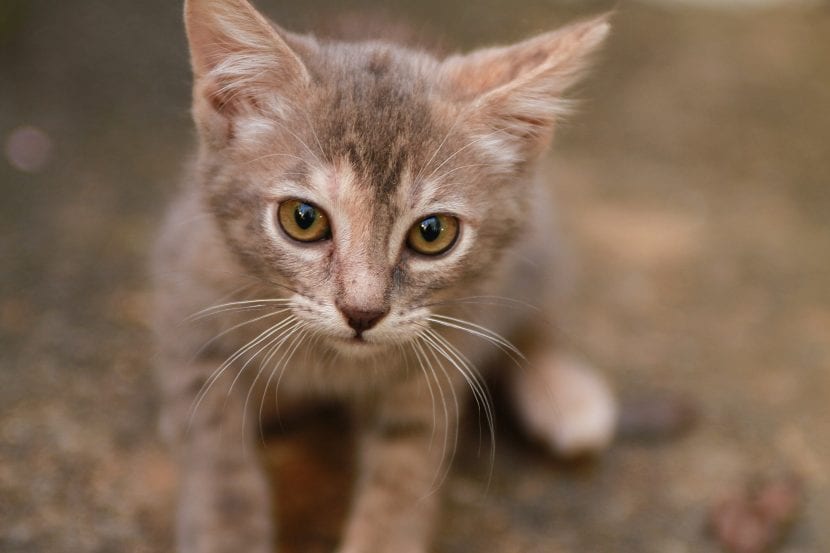
Kittens are cute. They have a very sweet and innocent look that awakens our protective instinct, and for that reason, we do everything we can to try to make them well and, above all, to make them happy. Unfortunately, it often happens that they are born with intestinal parasites that have been transmitted to them by the mother, or fleas and ticks begin to bother them after a few days of age. What should we do in these cases?
As they are still very small, we cannot use antiparasitic drugs for adult cats, since the recommended dose for them could be fatal for them. But fortunately, we can use other things to protect them. Let us know how to deworm kittens.
What are the parasites that can affect kittens?

Before getting into the subject, let's see what are the parasites that affect the little ones. These are divided into two large groups: external and internal.
External parasites
- Fleas: they are tiny insects, about 0,5cm, and are reddish or black depending on what climate you live in. It can be the intermediate host for tapeworms, and it can also transmit feline infectious anemia. More information about fleas, here.
- Ticks: they are quite reminiscent of a tiny spider. They measure about 0,5cm, and its body increases in size as it sucks the blood of the animal.
- Scabies: Although it is not common in kittens, if the mother has it, it is most likely that her children will be infected. It is caused by very small mites, usually of the genus Sarcoptes if they affect the skin, or Otodectes if they affect the ear. We will know that it has scabies if the kitten begins to have areas without hair, scabs, peeling of the skin, dandruff. If you want to know more about the types of scabies that affect cats, Click here.
- Ringworm or dermatomycosis: it is a fungal infection that is manifested by the appearance of circular bald spots.
Internal parasites
- You had- These are flatworms the size of a grain of rice that can be seen in feces. Fleas are the main transmitters, but the kitten can become infested if it comes in contact with feces from a sick animal.
- roundworms: they are whitish and long, up to 18cm. They live in the small intestine, but the larvae carry out an entero-hepato-pneumo-tracheo-enteral migration. It can be transmitted from mother to fetus through the placenta, or through the mammary glands. The human being can be infected.
- Hookworms: they are whitish 20mm. The kitten can be infected by ingesting larvae. It is rare.
- tricuros: also called tricephalos, they live in the colon and in the blind. It is very hardy, but fortunately, it is rare.
- filaria: it is a whitish parasite between 20 and 30 centimeters, which is transmitted by the Aedes aegypti mosquito. Once it enters the cat's body, it goes to the heart and pulmonary arteries. The symptoms can be confused with those of asthma.
- Coccidia: they are transmitted by the ingestion of their eggs, which can be found in mice, birds or others.
- Giards: A kitten - or a person - can become infected by having contact with feces that contain parasites, or by ingesting contaminated food or water.
How to deworm kittens
From 0 to 2 months

Now that we know what are the parasites, both internal and external, that can affect the little ones, let's know how to deworm younger kittens, between 0 and 2 months of age.
From experience, I can tell you that if you are looking for an antiparasitic product for such small kittens, you are going to get tired of searching. Why? Because, at least in Spain, there are hardly any. Yes there are for kittens from 2,5kg in weight, but not less. So that, to do?
Fight external parasites
Opt for the grandmother's remedy: vinegar. A bath with warm water (at 37ºC) and vinegar will eliminate all the external parasites that are affecting them.. But, yes, it is extremely important that before bathing him we put the bathroom heating on at least 30 minutes before, since at this age they are still not able to regulate their body temperature well and they could get cold.
After bath, you have to dry them well, conscientiously, with a towel.
… And the interns
But of course, this is for fleas, ticks and others, not for the inmates. What do we do with them? We can give the little felines a syrup called Telmin Unidia, for sale in veterinary clinics and pharmacies. The dose is 1ml / kg, so if they weigh for example 0,300kg, we have to give them 0,3ml. The treatment will last five days, and once it is finished we can see how it seems that they eat less often but with more desire 😉.
From 2 to 12 months

From this age, the problems to find suitable antiparasitics disappear. In fact, both in veterinary clinics and in pet stores we will find the products we need.
Eliminate external parasites from your kittens
To eliminate fleas, ticks, and others you can put a pipette for kittens, or antiparasitic necklace, also specific to them. With any of them they will be protected for at least a month.
… And the interns
For internal parasites they can be given antiparasitic pills -for sale in veterinary clinics-, or take advantage and put a pipette that serves both to eliminate external and internal. They are somewhat more expensive, but they are highly recommended if we do not want to have to force you to swallow a pill.

With these tips and tricks, your kitties won't have to worry about pesky parasites 🙂.